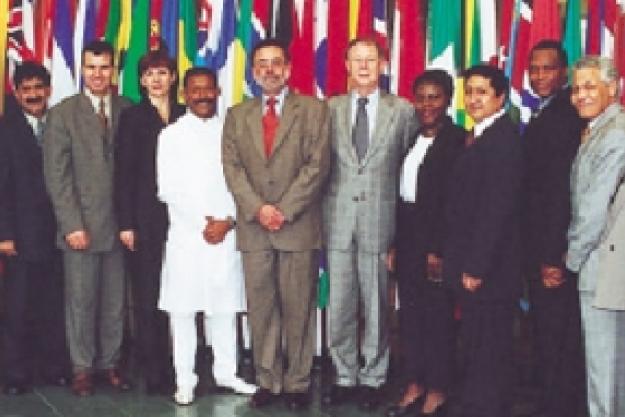
Closing Address to the Associate Programme 2001, 16 October 2001
As you know, this year’s Associate Programme brought together 11 participants from countries whose economies are in a state of development or transition, namely Algeria, Armenia, Ethiopia, Ghana, Guinea, Kenya, Lithuania, Morocco, Pakistan, Peru and Zimbabwe.
This training programme was planned in such a way that we could acquire theoretical and practical knowledge in the areas of chemistry and chemical engineering through lectures and practical exercises in chemical plants and facilities. We found that this training programme, organised by the OPCW for the second time, was of a high standard in its design and content. We can say that it was a programme aiming to provide chemists and chemical engineers from States Par ties with adequate information on the Chemical Weapons Convention, as well as on advanced industrial processes and plant operation practices. The programme was organised into five segments, each with different
objectives. Of these five segments, according to our evaluation, the induction segment, the university segment, and the industrial attachment comprised the core of the programme.
At this point I would like to highlight the accomplishments of each individual segment. In each of the segments a number of relevant topics were subjected to in-depth analysis. For instance, the material covered in the basic, advanced and internship segments was of paramount importance for both the implementation of the CWC and industrial development.
Some of the benefits gained from this programme can be summarised as follows:
- an increased understanding of the Convention and the various activities that the OPCW is carrying out in implementing it;
- the acquisition of theoretical knowledge of chemical processes and operations management;
- the development of skills in teamwork, communication and plant operation;
- a familiarisation with various types of modern and complex industrial facility set-ups, involving both organic and inorganic chemistry;
- a better understanding of integrated chemical plant design and of its systems of operation;
- an acquaintance with basic and relevant industrial working documents such as operating procedures, material safety data sheets, production and maintenance planning, and safety regulations;
- an exposure to new working environments, for example through working with individuals from various cultures; and
- an introduction to the regulations and systems used in chemical trading in Europe in general, and in the Netherlands in particular.
In general we can say that the theoretical and practical knowledge gained during the training programme met most of our expectations. Moreover, the various lessons learned and the experience acquired during the past ten weeks will no doubt enhance both the promotion and the implementation of the OPCW’s objectives.
At this juncture it is worth mentioning the effort made by the International Cooperation and Assistance Division, and in particular by its International Cooperation Branch, in organising and bringing this programme to fruition. The goals of the programme could not be fully realised without the exemplary international cooperation of the Secretariat, the States Par ties, and all the companies involved in the
different segments.
We would therefore like to request the OCPW to convey our sincere appreciation and thanks to the United Kingdom of Great Britain and Northern Ireland, the Canadian Government, Exxon Mobil Chemical (the Netherlands), Du Pont de Nemours B.V. (the Netherlands), Solvay Noh Belgium, D-Societe Normande Del’Azote (Hydro-France), and Lyondell Chemie (the Netherlands ) for the financial, material, and technical support provided to us during the training period.
Last, but not least, we would like to sincerely thank the OPCW staff for their encouragement and support from the beginning to the end of this training programme.
